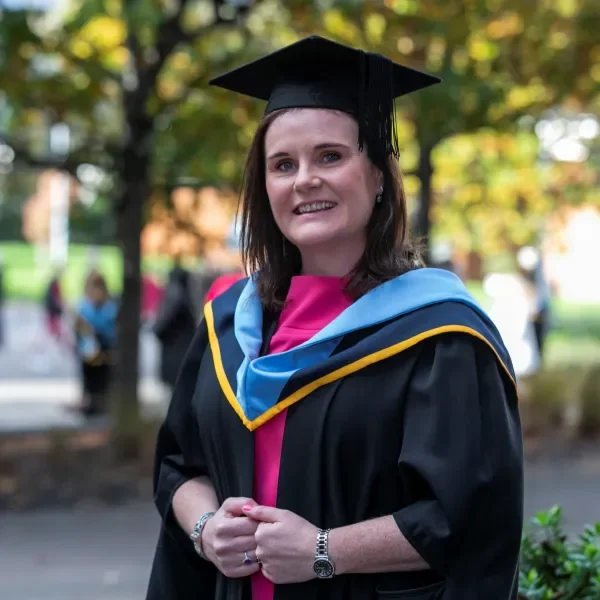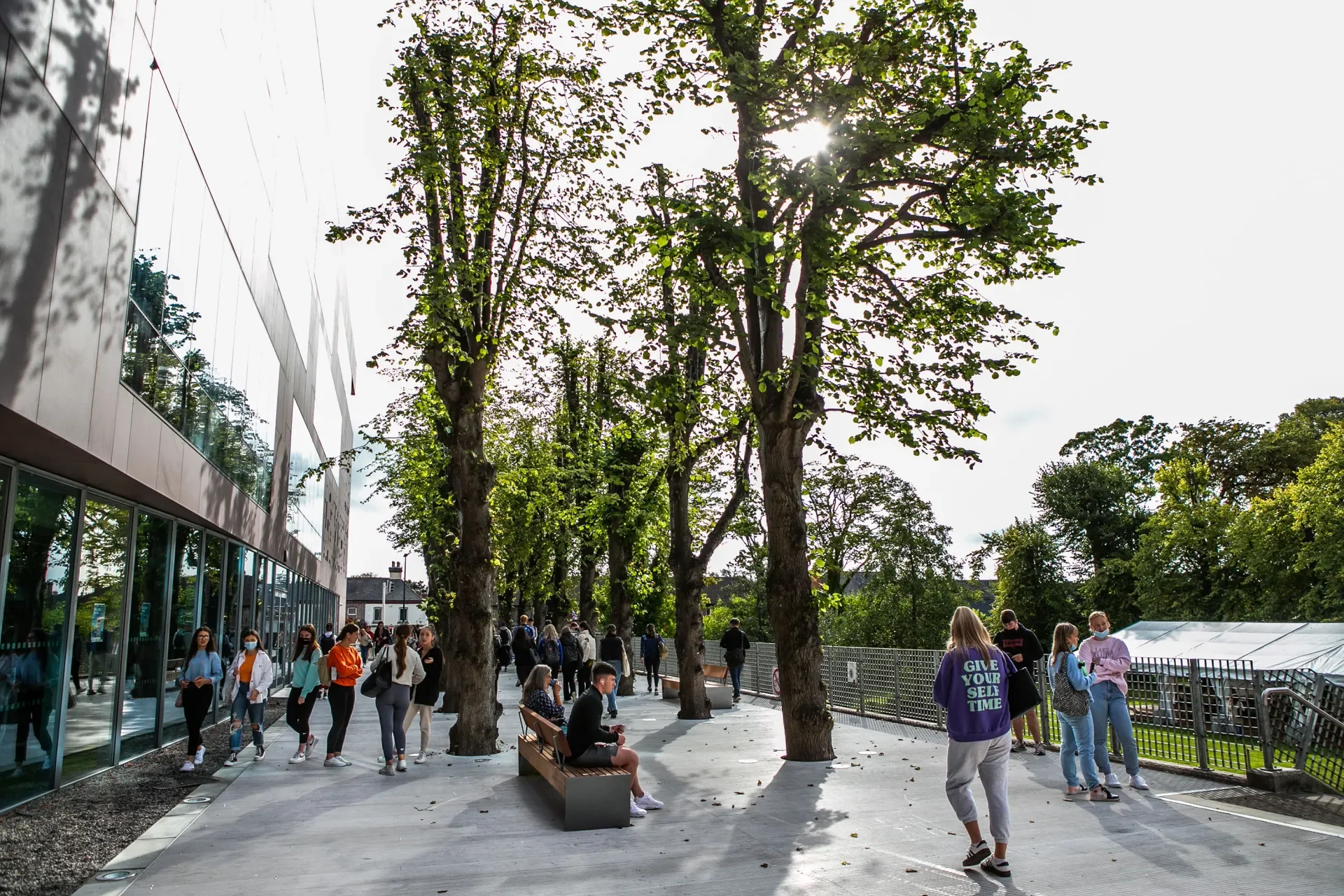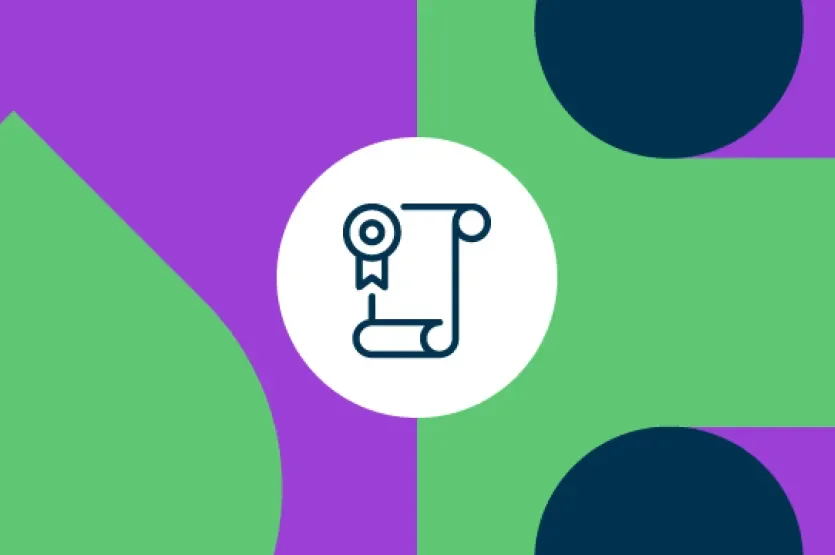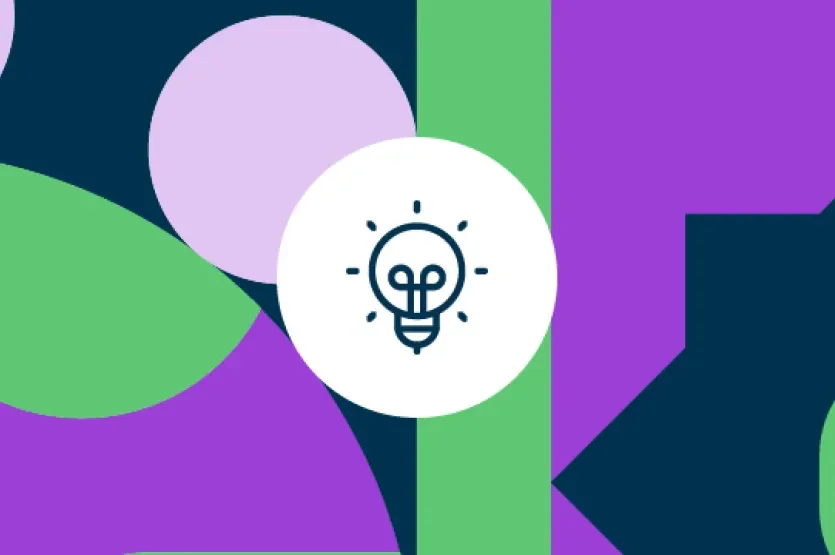Overview
During the programme, you’ll explore theories of organisational management and leadership, organisational decision-making and the psychology of organisational behaviour, change management and culture in organisations. You’ll also develop skills to help you problem-solve and make informed decisions.
Achieve better balance with flexible learning
Modules are delivered in-person and online to help you balance work or home commitments, and you’ll study in a diverse and inclusive environment. You’ll also undertake a research dissertation in the second year of the programme.
Once you graduate, you’ll have the skills and knowledge to move into leadership roles in your current workplace; industry, schools, higher education, healthcare or learning and development.
Why DCU
DCU People

Justine Carty was already a well-established solicitor and was well-known within the Law Society when she decided to do an education-based Masters’.
Read more about Justine Carty
Careers & Further Options
Careers
The MSc in Education and Training Management (Leadership) at DCU is a management qualification.
It builds on a long heritage of equipping educators moving into, or holding, leadership roles with the knowledge and skills to succeed in those roles.
It is the ideal qualification for those who wish to progress in their current employment environment connected to the broad education and training sector including schools, industry training, health and many areas of public sector management.
For others, the MSc as a management qualification has allowed participants to make a career change.
Teachers have moved into leadership roles in schools since their graduation. These roles include Principal, Deputy Principal, and other senior roles which oversees different areas of responsibility in schools.
Other graduates have moved into new careers and leadership roles after completing the programme. These roles include Head of Learning and Development, lecturer roles in the Higher Education sector, or working in advisory and leadership roles in Agencies.
Other graduates have built a new career pathway from doing the programme.
"DCU graduates are highly sought after by employers. Our Graduates work in environments ranging from large multinationals to SMEs, family businesses and start-ups across every sector.
DCU Careers Service has a number of learning and development initiatives in place for our students, giving them the skills they need for a successful career path."
Entry Requirements
Applicants must have a good honours degree (minimum 2.2) with three years substantial experience working in a recognised education/training environment.
In certain circumstances, applicants not possessing the above qualifications may be considered if they are able to present, at interview, evidence of professional experience and responsibility in a relevant area of work, and high-level interest in the research literature relevant to one of the themes highlighted in the programme. Such applicants will be required to submit a written assignment or portfolio prior to interview.
Candidates should note that an interview is part of the selection process for this programme. Shortlisted candidates are expected to be available for interview. Interview slots will be allocated on a first come, first served basis. It is not possible to accommodate other interview dates.
Due to the specialist nature of this programme, additional criteria may be used to assess suitability to undertake this programme. For further information, please contact the Programme Chair using the contact details above.
Recognition of Prior Learning (RPL) applicants are required to submit a cover letter along with their application under the Transcripts section of the portal, affirming their intent to apply for RPL. For more information on RPL see here.
Programme Structure
The Masters in Education and Training Management (Leadership) programme is a two-year part-time programme.
This is a blended programme that takes place on selected Wednesday evenings from 6.30pm to 8.30pm and on selected Saturdays. The programme commences in late September.
The Graduate Diploma element of the programme consists of six modules and runs over three semesters. The dissertation element is a piece of independent research that takes place in the second year of the programme.
Using a combination of blended and face-to-face sessions structured to support achievement for students undertaking Masters level study while balancing work and family commitments, this programme offers the opportunity to:
- Develop the knowledge and skills to provide effective leadership in the workplace and society.
- Acquire key principles, best practices, characteristics and the organisational strategy required by managers and leaders in today's fast-changing and complex operating environment.
- Develop self-management skills to enable them to become more effective managers, educators and learning facilitators
A key benefit of the MSc in Education and Training (Leadership stream) at DCU is the range of backgrounds of programme participants. The programme is designed for practising and aspiring leaders and managers in settings where learning is core.
This diversity of backgrounds contributes a breadth of experience and a dynamic learning environment where a range of workplace cultures, and their implications, can be explored.
The programme is delivered by a team of academics and practising experts with applied experience in leadership and management.
At the same time, DCU's strategic commitment as a University of Enterprise builds on our reputation for innovation and fosters a highly applied approach to programme delivery.
Full use is made of the virtual learning environment to ensure participants can self-pace their study yet remain fully involved in a community of practice.
Fees and Funding
Fees
How To Apply
This programme will not run in September 2025 however we have a similar programme, MSc. in Education and Training Management (eLearning), which may interest you. Please click here for more information.
To apply for this programme:
All Applicants must apply through DCU's Student Application Portal which is available here. Here's a quick step by step guide if you need help with your application.
• Provide certified academic transcripts for all years of study at college or university in original language*, with certified English translations if applicable.
• Provide a copy of degree certificate / parchment.
• Provide a copy of passport.
• Provide a personal statement of 500 words, outlining your reasons for applying.
• Where an applicant is in their final year of their undergraduate degree, please submit certified transcripts for all years completed to date.
International candidates are expected to have educational qualifications of a standard equivalent to those outlined above. In addition to the above, where such candidates are non-native speakers of the English language they must satisfy the university of their competency in the English language which meets DCU entry requirements
If you require a study visa and are a Non EU student, you are not eligible to apply for part-time programmes as study visas are only granted for full-time programmes.
Application Deadline
Applications will be accepted on a rolling basis until the programme is full or until the following dates:
Closing date for EU Applicants is Friday the 30th of August 2024.
All entry requirements should be met before the commencement of the programme.
Application Queries
For EU applicant queries, please visit https://www.dcu.ie/registry/eu-postgraduate-taught-admissions or email postgraduateadmissions@dcu.ie
For non EU applicant queries, please visit https://www.dcu.ie/registry/international-admissions-undergraduate-and-postgraduate or email internationaladmissions@dcu.ie
Commencement of Programme
The programme will not run in September 2025 however we have a similar programme, MSc. in Education and Training Management (eLearning), which may interest you. Please click here for more information.
Life On Campus
At DCU, our students can expect a unique campus experience. We are known for our excellent teaching and learning facilities, our active clubs and societies, and our great social and sporting facilities. All this makes DCU an exciting place to be.
DCU has three academic campuses; Glasnevin, St. Patrick’s and All Hallows (both in Drumcondra), all close to Dublin City centre.
They can be reached by public transport, Dublin Bus and Bus Éireann, with our Drumcondra campuses a ten minute walk from Drumcondra Train Station. Glasnevin is a 20 minute walk from St Patrick’s and All Hallows. They are also linked by Dublin Bus.
Each campus has a library (O’Reilly, Cregan and Woodlock Hall), study spaces, restaurants, and on-campus residencies. There are sports facilities on Glasnevin and St. Patrick’s, and there is a dedicated sports campus, St Claire’s, located near Glasnevin on the Ballymun Road.
DCU’s 19,000 students have access to exceptional teaching and learning facilities across our three academic campuses.
These include modern learning theatres, research centres, a new media and TV studio, radio/podcast studios, computer suites and advanced labs in the areas of Languages, Engineering, Physics, Chemistry and Biotechnology, as well as a Sports Performance centre and a training hospital ward. In 2021, we opened our first virtual reality ‘Leadership Lab’, which is located in our Business School.
We continue to improve and update our facilities. For example, construction of a new world-class STEM facility is underway on the Glasnevin campus. With capacity for an extra 3,000 STEM students, this facility will advance DCU’s international reputation for excellence in science and health, computing and engineering disciplines.
Studying in DCU isn’t just about course work. The university is rich in student life and activities.
There are more than 140 clubs and societies for students in DCU, with ‘Clubs & Socs’ days taking place on both the Glasnevin and Drumcondra campuses at the start of the academic year. They span everything from rugby to rock climbing, anime to jazz.
For many students, sport is an important part of the DCU experience. DCU’s Sports Complex boasts a 25 metre swimming pool, fitness centre gym, all-weather pitches and squash courts, as well as soccer, GAA and rugby pitches. DCU Dóchas Éireann, the university’s GAA club, is the largest third level Gaelic Games club in the country. Meanwhile, DCU Athletics has been Ireland’s highest achieving university club for many years. And DCU has dozens of other clubs to get involved in, from Archery to Weightlifting.
The Glasnevin campus is home to our purpose built, state-of-the-art student centre, The U, which serves the needs of a rapidly growing student body. Here, you will find the Student Leadership and Lifeskills Centre, performing arts and cultural spaces for students and the wider community, and the Entrepreneurship and Innovation Hub. Also located on our Glasnevin campus is The Helix, our renowned performing arts centre.
On our St Patrick’s campus, we have the Java Student Hub, a vibrant, warm and welcoming space where students can meet for coffee, play music, use the projector to watch events, or just relax. The walls of the Java Hub were designed based on the cultural history of St Patrick’s Campus, including the special references to the notable sporting history and history of the arts.
We have a number of academic, professional and social supports for students.
Student Advice & Learning Skills Centre - Offers a wide range of supports and services to students and advice
The Writing Centre - drop-in writing workshops for students through the academic year
Maths Learning Centre - provides maths support for students of all ability levels with maths modules
Student Learning - facilitate the transition from passive to active learning for students at DCU, by teaching study skills, nurturing critical thinking and building student confidence.
Careers work with students to help them on their professional journey into graduate employment.
Our student support team offers a comprehensive support programme, helping students make that all important transition into university life and focusing on building confidence and skills which are key to success at third level.

DCU St Patrick's Campus
FAQs
-
What is the single most important thing a prospective student should know about this programme?
The range and depth of the modules on the programme and the applicability of learning and assignments to the workplace settings of participants is commonly reported as contributing to the programme meeting student expectations. Positive class dynamic and opportunity to collaborate with people from a range of work settings.
-
Why would a student choose to do this programme instead of a different but similar one? In other words, what makes this programme distinctive, exciting or novel?
The broad scope of the programme beyond the school setting is of specific appeal and distinguishes the programme from other master’s level qualifications. The programme is delivered and facilitated by a team of academics and practising experts with applied experience in leadership and management. Past students from the programme overwhelmingly report the mix of professional backgrounds contributed to their learning. -
What kind of people do you expect to be drawn to a programme like this, and to thrive while a student on it?
Participants in the Leadership programme are drawn from across the primary, post-primary, further, higher, and adult education sectors as well as from corporate industry, health personnel, governmental departments, state agencies, NGOs and community organisations.
-
What are the key knowledge areas and skills a student will gain by doing this programme?
Deep understanding and critical awareness of management and leadership concepts, including the leading theories and good practices employed in a variety of situations and circumstances;
Utilise tools and frameworks to assist in envisioning, strategic planning, networking, evaluating and innovating for changes;
Develop a capacity to problem solve, make informed decisions and network and communicate to enhance organisational performance and social inclusion;
An ability to make improvement to processes, systems, practices, and structures leading to improved performance and results;
An understanding of an ability to reflect on the importance of the leader’s role in society and how this role may be used to effect change where appropriate;
A personal capacity to continually grow as a person and contribute to the good of society;
An ability to consider team members’ opinions and to put in place a plan/design/process that is cognisant and respectful of these opinions;
An understanding and ability to implement and maintain the highest ethical standards of practice
-
What are the opportunities for: Work placement, Study abroad, Newer ways of learning
This is an applied Masters programme and candidates applying for the programme are already in work contexts. -
Could you name three typical careers that a graduate from this course could pursue?
Teachers have moved into leadership roles in schools since graduation e.g. Principal, Deputy Principal, and roles of responsibility in schools.
Others have moved into new careers and leadership roles after completing the programme e.g. Head of Learning and Development, Lecturer roles in Higher Education, Advisory and leadership roles in Agencies.
Some participants have built a new career pathway from doing the programme.
What courses are offered by the DCU Institute of Education?
DCU Institute of Education brings together students of education and provides a rich menu of undergraduate courses across all sectors from early childhood, to primary and post-primary and further and higher education. We offer a range of taught and research postgraduate courses at doctoral, masters, diploma and certificate level and have a distinguished record in providing continuing professional development.
Is there Garda vetting for students who study DCU Institute of Education courses?
Garda vetting is required for all students who have unsupervised access to children and vulnerable adults as part of their studies at DCU. Applicants must successfully pass the Garda vetting process in order to complete the registration process.
What are the potential teaching pathways for primary, post-primary and further education and training offered by DCU?
Primary Teaching Pathways
Undergraduate*
Postgraduate**
- Professional Master of Education (Primary Teaching) - DC970
* Please ensure that you consult minimum entry requirements and CAO points for all undergraduate programmes
** Please ensure that you consult minimum entry requirements for all postgraduate programmes
Post-Primary Teaching Pathways
Undergraduate*
- Bachelor of Religious Education & English or History or Music - DC010 | DC011 | DC012
- Bachelor of Education in Gaeilge and French or German or Spanish - DC013
- Bachelor of Education in Technology, Engineering and Graphics - DC015
- Bachelor of Science (Hons) in Science Education - DC203
- Bachelor of Science (Hons) in Physical Education with Biology - DC205
- Bachelor of Science in Physical Education with Mathematics - DC206
Postgraduate**
- Professional Master of Education (Post-Primary Teaching) - DC905
* Please ensure that you consult minimum entry requirements and CAO points for all undergraduate programmes
** Please ensure that you consult minimum entry requirements for all postgraduate programmes
Further Education and Training Teaching Pathways
Undergraduate*
- BSc (Hons) in Education and Training (Further, Adult and Continuing Education) - DC235
* Please ensure that you consult minimum entry requirements and CAO points for all undergraduate programmes









